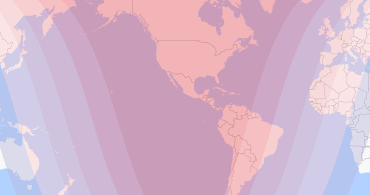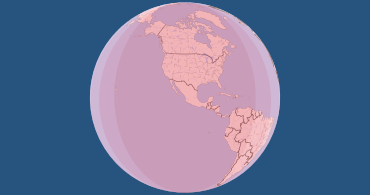This eclipse is visible in Tokyo - go to local timings and animation
Where to See the Eclipse
Try our new interactive eclipse maps. Zoom in and search for accurate eclipse times and visualizations for any location.
Regions seeing, at least, some parts of the eclipse: Europe, Much of Asia, Much of Australia, Much of Africa, North America, South America, Pacific, Atlantic, Arctic, Antarctica.
This eclipse is visible in Tokyo - go to local timings and animation
Eclipse Map and Animation
The animation shows where this total lunar eclipse is visible during the night (dark “wave” slowly moving across the Earth's surface).
Shades of darkness
Night, moon high up in sky.
Moon between 12 and 18 degrees above horizon.
Moon between 6 and 12 degrees above horizon. Make sure you have free line of sight.
Moon between 0 and 6 degrees above horizon. May be hard to see due to brightness and line of sight.
Day, moon and eclipse both not visible.
Note: Twilight will affect the visibility of the eclipse, as well as weather.
The entire eclipse is visible from start to end.
The entire partial and total phases are visible. Misses part of penumbral phase.
The entire total phase is visible. Misses part of partial & penumbral phases.
Some of the total phase is visible. Misses part of total, partial & penumbral phases.
Some of the partial phase is visible. Misses total phase and part of partial & penumbral phases.
Some of the penumbral phase is visible. Misses total & partial phases.
The eclipse is not visible at all.
Note: Areas with lighter shadings left (West) of the center will experience the eclipse after moonrise/sunset. Areas with lighter shadings right (East) of the center will experience the eclipse until moonset/sunrise. Actual eclipse visibility depends on weather conditions and line of sight to the Moon.
When the Eclipse Happens Worldwide — Timeline
Lunar eclipses can be visible from everywhere on the night side of the Earth, if the sky is clear. From some places the entire eclipse will be visible, while in other areas the Moon will rise or set during the eclipse.
| Eclipse Stages Worldwide | UTC Time | Local Time in Tokyo* | Visible in Tokyo |
|---|---|---|---|
| Penumbral Eclipse begins | 2月3日 (金)4時15分05秒 | 2月3日 (金)13時15分05秒 | No, below the horizon |
| Partial Eclipse begins | 2月3日 (金)5時28分03秒 | 2月3日 (金)14時28分03秒 | No, below the horizon |
| Full Eclipse begins | 2月3日 (金)6時45分00秒 | 2月3日 (金)15時45分00秒 | No, below the horizon |
| Maximum Eclipse | 2月3日 (金)7時16分46秒 | 2月3日 (金)16時16分46秒 | No, below the horizon |
| Full Eclipse ends | 2月3日 (金)7時48分34秒 | 2月3日 (金)16時48分34秒 | No, below the horizon |
| Partial Eclipse ends | 2月3日 (金)9時05分31秒 | 2月3日 (金)18時05分31秒 | Yes |
| Penumbral Eclipse ends | 2月3日 (金)10時18分24秒 | 2月3日 (金)19時18分24秒 | Yes |
* The Moon is below the horizon in Tokyo some of the time, so that part of the eclipse is not visible.
Quick Facts About This Eclipse
| Data | Value | Comments |
|---|---|---|
| Magnitude | 1.168 | Fraction of the Moon’s diameter covered by Earth’s umbra |
| Obscuration | 100.0% | Percentage of the Moon's area covered by Earth's umbra |
| Penumbral magnitude | 2.259 | Fraction of the Moon's diameter covered by Earth's penumbra |
| Overall duration | 6 hours, 3 minutes | Period between the beginning and end of all eclipse phases |
| Duration of totality | 1 hour, 4 minutes | Period between the beginning and end of the total phase |
| Duration of partial phases | 2 hours, 34 minutes | Combined period of both partial phases |
| Duration of penumbral phases | 2 hours, 26 minutes | Combined period of both penumbral phases |
Eclipse calculations usually accurate to a few seconds

An Eclipse Never Comes Alone!
A solar eclipse always occurs about two weeks before or after a lunar eclipse.
Usually, there are two eclipses in a row, but other times, there are three during the same eclipse season.
This is the second eclipse this season.
First eclipse this season: 2102年1月19日木曜日 — Partial Solar Eclipse

